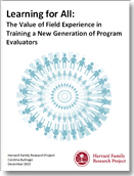The Harvard Family Research Project separated from the Harvard Graduate School of Education to become the Global Family Research Project as of January 1, 2017. It is no longer affiliated with Harvard University.

|
December 3, 2015 Learning for All: The Value of Field Experience in Training a New Generation of Program EvaluatorsCarolina Buitrago with Sunindiya Bhalla, Nomi Davidson, Sarah Davila, Anairis Hinojosa, Babe Liberman, and Katie Tosh |
Article Information
- Full Text (HTML)
- Full Text (PDF: 4991 kb)
Related Resources
FINE Newsletter, Volume VII, Issue 4
Issue Topic: Evaluation and Improvement Science in Action
Voices From the Field
Professionals in various fields have the opportunity to train in real-life situations before they take on a job by themselves. In program evaluation, however, preservice training usually focuses on coursework oriented to research design and methods. After completing these studies, evaluators go off to conduct evaluations guided primarily by their technical knowledge. Candice Bocala, a lecturer at the Harvard Graduate School of Education, and a program evaluator herself, has designed a course to broaden the scope of traditional classes by focusing on evaluative inquiry and improvement science. In addition, her course exposes students to on-the-ground experiences as they develop evaluation plans with partner organizations. The results of Bocala’s approach are remarkable: The six-week field experience boosts learning for everyone involved.
This article (PDF) summarizes what student consultants did to strengthen evaluation practices for their partner organizations as well as what the organizations did to make the experience a productive one for everyone involved.
What student consultants did:
- Offered a fresh perspective that helped organizations reflect on what they do;
- Raised important questions to identify key assumptions;
- Enhanced a sense of an organization’s capacity and focus on evaluation; and
- Communicated with program staff to develop a working understanding of the organization.
What partner organizations did:
- Invested time and energy to prepare for and do the joint work;
- Engaged in the joint work while keeping an open mind;
- Provided “distilled” information that balanced the big picture and program details; and
- Communicated regularly with student consultants, including providing feedback on their final papers.
This resource is part of the November FINE Newsletter. The FINE Newsletter shares the newest and best family engagement research and resources from Harvard Family Research Project and other field leaders. To access the archives of past issues, please visit www.hfrp.org/FINENewsletter.
